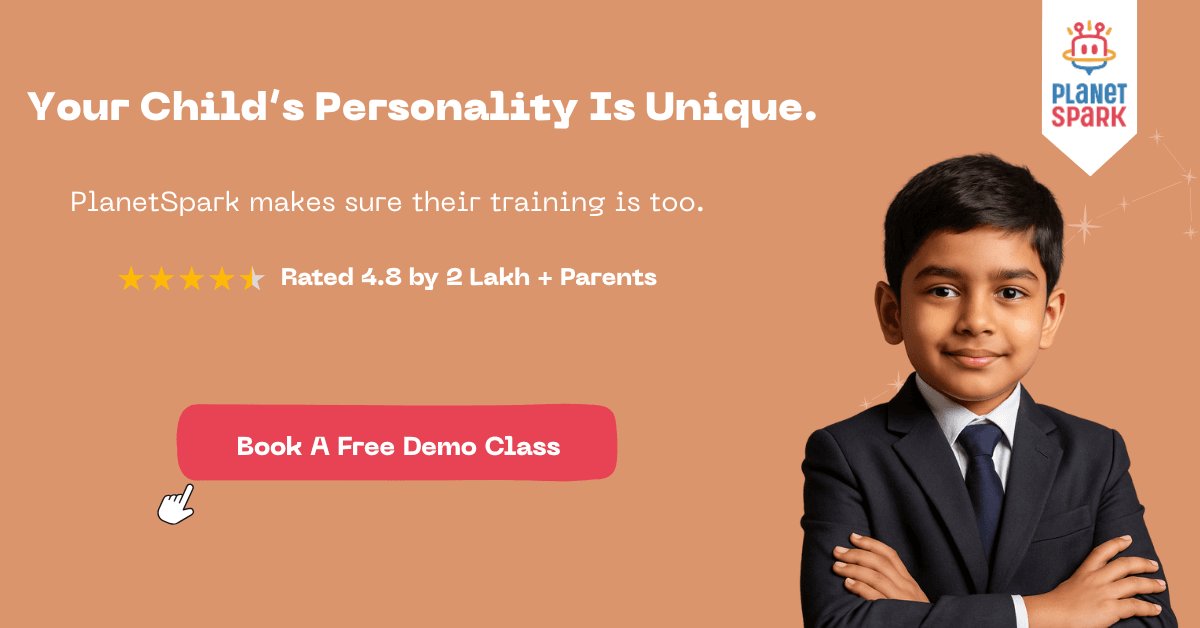Factors Affecting Personality | Complete Parent Guide

Table of Contents
- 1. Family Environment: The First Influence That Lasts a Life
- 2. Parenting Style: The Compass That Directs Growth
- 3. Peer Influence: The Power of Social Belonging
- 4. School Environment and Teacher Relationships
- 5. Birth Order and Sibling Dynamics
- 6. Cultural and Societal Expectations
- 7. Media, Technology, and Screen Influence
- 8. Physical Health, Diet, and Sleep Patterns
- 9. Life Events and Experiences
- 10. Internal Beliefs and Self-Perception
- Types of Human Personalities: Common Childhood Patterns
- Personality-Specific Training: Tailoring Development Approac
- Why One-Size-Fits-All Doesn’t Work in Personality Developmen
- How PlanetSpark Helps Build the Right Personality: One Child
- Frequently Asked Questions (FAQs)
Understanding the factors affecting personality can help parents, educators, and mentors create environments that build confident, emotionally intelligent, and well-rounded individuals.
In this blog, we explore all major influences that shape personality, common personality types in children, and how customized personality training like PlanetSpark’s programs can nurture growth effectively.
1. Family Environment: The First Influence That Lasts a Lifetime
Family is where personality takes its very first steps. Whether it’s how affection is shown or how conflict is resolved, children internalize these early experiences deeply. A home filled with emotional warmth and open communication becomes a breeding ground for secure, expressive personalities. On the other hand, environments that are overly critical, neglectful, or chaotic may foster anxiety, low self-esteem, or social withdrawal.
From dinner table conversations to how parents react to failures, everything silently educates a child. Among the many factors affecting personality, the emotional climate at home is the one that begins the earliest and leaves the most lasting impression.
2. Parenting Style: The Compass That Directs Growth
Authoritative parenting which blends warmth with structure has been consistently linked to balanced personality development. It encourages independence while maintaining guidance. In contrast, overly permissive or authoritarian parenting can result in behavioral extremes either rebelliousness or timidity.
Parents who actively listen, support emotional growth, and discipline constructively raise children who are more likely to grow into socially competent, resilient adults. Of all factors affecting personality, parenting style is perhaps the most direct and modifiable one.
3. Peer Influence: The Power of Social Belonging
As children start school and social circles expand, peer influence becomes an incredibly powerful factor. The desire to fit in, seek approval, or imitate others can lead to significant shifts in personality. While positive friendships can enhance empathy, communication, and emotional maturity, toxic or peer-pressured environments may breed conformity, insecurity, or impulsive behavior.
Encouraging your child to choose friends wisely, and keeping communication lines open at home, can help buffer against negative peer effects.

4. School Environment and Teacher Relationships
Schools don’t just teach academics; they are social ecosystems that contribute heavily to personality growth. Encouraging teachers who create safe, engaging classrooms can spark curiosity, confidence, and creativity. Conversely, rigid or negative academic environments may limit self-expression or dampen motivation.
Participation in school activities, opportunities for leadership, and positive student-teacher interactions are essential factors affecting personality development in growing children.
5. Birth Order and Sibling Dynamics
Birth order subtly shapes how children view themselves and interact with the world. Firstborns may naturally gravitate toward responsibility and leadership, while middle children might become negotiators or peacekeepers. Youngest siblings often evolve as charmers or free spirits, benefiting from a relaxed parenting style.
Siblings also act as early social partners learning conflict resolution, empathy, competition, and teamwork all of which leave their mark on a child’s personality.
6. Cultural and Societal Expectations
Culture provides the backdrop against which personality traits are encouraged or suppressed. Children from collectivist cultures may be raised to prioritize harmony, obedience, and interdependence, while those from individualistic cultures are often taught to assert independence and self-expression.
Society shapes beliefs about gender roles, success, and social behaviors. These external norms become internalized, significantly influencing values, confidence levels, and behavioral choices.
7. Media, Technology, and Screen Influence
Digital exposure is one of the most modern and rapid factors affecting personality. From YouTube videos to social media trends, children today are consuming content that shapes their attitudes, language, aspirations, and even body image.
While educational platforms can be a positive influence, excessive screen time or unfiltered content can lead to attention issues, social comparison, or desensitization to real-world emotions. Balanced screen use and mindful content curation are essential for healthy personality development.
8. Physical Health, Diet, and Sleep Patterns
We often underestimate how much physical health contributes to personality traits. A well-rested, nourished child is more likely to be emotionally stable, focused, and sociable. In contrast, nutritional deficiencies, chronic health issues, or irregular sleep patterns can cause mood swings, irritability, and social withdrawal.
Good health doesn’t just benefit the body. it plays a vital role in shaping the mind and personality.
9. Life Events and Experiences
Significant life events like parental separation, relocation, academic failure, or loss of a loved one can drastically alter a child’s emotional makeup. Some may become withdrawn or anxious, while others may develop resilience and adaptability.
These experiences, whether traumatic or growth-oriented, are powerful factors affecting personality because they often trigger introspection, identity questioning, or coping mechanism formation.
10. Internal Beliefs and Self-Perception
How children view themselves whether they think they’re smart, funny, shy, or capable forms the core of their personality. These beliefs can be shaped by feedback from parents, peers, or teachers.
Self-esteem, mindset, and emotional regulation are internal factors that evolve over time but play a foundational role in personality development. Positive reinforcement, realistic goal-setting, and emotional safety help nurture a healthy inner self.
Types of Human Personalities: Common Childhood Patterns
Every child is different, but many fall into broader personality categories that can help parents understand how to guide them better.
a. The Extroverted Child
They are expressive, energetic, and enjoy being around others. They speak freely, take initiative, and may struggle with patience or listening.
b. The Introverted Child
These kids are reflective and may prefer solo activities. They may appear shy but are often deep thinkers with a strong inner world.
c. The Ambivert
A mix of both introvert and extrovert traits, ambiverts can thrive in both solitude and social settings. They adapt easily and respond well to varied environments.
d. The Analytical Child
They love puzzles, patterns, and logic. They may struggle with emotions but excel in structured thinking and detailed analysis.
e. The Creative/Expressive Child
Imaginative and sensitive, these children express themselves through art, stories, or play. They may be emotionally intense and require gentle guidance.
Understanding the type of personality your child exhibits helps in tailoring interventions and support.
Personality-Specific Training: Tailoring Development Approaches
Kinds Types of Human Personalities: Common Childhood Patterns
Every child is a unique blend of emotions, habits, and traits but psychologists and educators often group personalities into broad types to better understand how children perceive, interact with, and respond to their world. Recognizing your child’s personality type helps you tailor their learning, communication, and confidence-building environments.
Below are some of the most common childhood personality types, their core traits, potential challenges, and ways to nurture them effectively.
1. The Extroverted Child
Extroverts are socially energized and thrive in environments where they can express themselves freely. They’re the children who enjoy group play, love to share stories, and are often the first to volunteer in class or raise their hands.
Core Traits:
Energetic and enthusiastic
Outspoken and expressive
Enjoys group activities and being the center of attention
Quickly builds friendships
Feels bored or restless when alone for long
Developmental Strengths:
Natural leadership tendencies
Strong verbal communication skills
Builds a wide social circle early on
Comfortable with performance-based activities
Potential Challenges:
May struggle to listen or take turns
Can be impulsive or attention-seeking
May overlook quieter peers or personal boundaries
How to Nurture:
Encourage leadership in structured ways like leading a project or emceeing an event. Use activities like debates, group presentations, and roleplay to channel their energy productively. Also, teach empathy, patience, and the importance of reflective listening.
2. The Introverted Child
Introverts are inward-focused and recharge in calm, quiet settings. They are thoughtful observers who may not speak up often, but they process deeply. Their silence is often mistaken for shyness, though it’s usually a sign of reflection.
Core Traits:
Quiet, reserved, and prefers solo activities
Reflective and observant
Enjoys deep conversations with one or two close friends
Easily overstimulated in busy environments
May need time before opening up
Developmental Strengths:
Strong imagination and focus
Excellent listening and observational skills
Often emotionally intelligent
Great at working independently
Potential Challenges:
Hesitant to try new or unfamiliar experiences
May avoid expressing themselves in groups
Struggles with performance-based assessments
How to Nurture:
Provide safe, low-pressure platforms for expression like journaling, art, or storytelling. Avoid pushing them into group events too quickly; instead, let them warm up. Praise effort, not just outcome, and offer positive reinforcement during social interactions.
3. The Ambivert Child
Ambiverts are the flexible middle ground between introverts and extroverts. They can be social and energetic in the right environment but also enjoy alone time. Their adaptability makes them dynamic learners and communicators.
Core Traits:
Balanced between outgoing and reserved
Adapts easily to different social settings
Can work well alone or in teams
Expressive but not attention-seeking
Easily builds rapport with a range of personalities
Developmental Strengths:
High social intelligence
Versatile communication skills
Comfortable with variety in learning methods
Emotionally balanced and grounded
Potential Challenges:
May feel conflicted between socializing and needing space
Prone to overcommitting or burnout
Sometimes overlooked due to not being the most dominant or quietest
How to Nurture:
Offer a mix of solo and group activities. Allow them to experiment with leadership and support roles. Give them variety in experiences creative, academic, and social so they can explore both sides of their personality comfortably.
4. The Analytical or Logical Thinker
These are the “why” kids always questioning, solving, and observing. Analytical children thrive in structured environments that allow exploration and problem-solving. They may not be overly expressive emotionally, but they’re focused, precise, and thoughtful.
Core Traits:
Loves numbers, patterns, and reasoning
Curious about how things work
Often perfectionistic or detail-oriented
Struggles with ambiguity or emotional conversations
May come across as serious or rigid
Developmental Strengths:
Excellent problem-solving and critical thinking skills
Self-motivated and goal-driven
High academic potential, especially in STEM
Persistent and task-focused
Potential Challenges:
May struggle with teamwork or social dynamics
Can get frustrated with creative or open-ended tasks
Emotionally reserved and less expressive
How to Nurture:
Introduce logic-based games, puzzles, and coding. Encourage emotional literacy through reflective writing or story analysis. Gently guide them into collaborative settings where they can use their thinking skills while learning to navigate group dynamics.
5. The Creative or Expressive Child
Creative children view the world through a colorful lens. Whether through stories, art, dance, or imagination, they thrive on expression and originality. These kids often have rich inner worlds and emotional depth.
Core Traits:
Highly imaginative and emotionally expressive
Drawn to stories, art, and performance
Sensitive to feedback and environment
Intuitive and open-minded
Enjoys improvisation and abstract thinking
Developmental Strengths:
Exceptional emotional awareness
Strong storytelling and artistic abilities
Naturally empathetic and expressive
Innovative problem-solvers
Potential Challenges:
May get easily distracted or daydream often
Sensitive to criticism or pressure
May resist structured routines or linear thinking
How to Nurture:
Enroll them in creative writing, music, or drama classes. Give them unstructured time to create. Be patient with their non-linear approach to learning and help them channel emotions through artistic platforms.

Why One-Size-Fits-All Doesn’t Work in Personality Development
A critical insight when analyzing the factors affecting personality is realizing that each child needs a unique growth environment. A blanket approach might hinder rather than help.
Key Takeaway for Parents:
Observe your child closely: How do they react to praise? Do they prefer group activities or solo ones?
Adapt teaching styles to their temperament.
Combine emotional support with skill-building sessions for holistic development.
How PlanetSpark Helps Build the Right Personality: One Child at a Time
At PlanetSpark, we recognize that no two children learn or express the same way. That’s why our Personality Development Classes are structured around personalized growth paths that adapt to your child’s natural style.
Here's what makes PlanetSpark’s approach unique:
Tailored Curriculum Based on Personality Types
Whether your child is shy, expressive, curious, or logical, our mentors adapt activities to help them grow holistically.Real-World Exposure
From TEDx-style speaking to stand-up comedy and podcasting, we provide platforms that let kids find their voice.Activity-Driven Confidence Building
Children participate in mock interviews, roleplays, storytelling contests, and more, making growth exciting and experiential.Live 1:1 Mentorship
Our certified trainers build trust, consistency, and accountability key ingredients in shaping personality.Feedback and Growth Reports
We don’t just teach we measure progress in soft skills, communication, confidence, and presence.
Ready to Shape the Right Personality in Your Child?
Don’t leave your child’s personality to chance. Let PlanetSpark guide them with expert-led, fun, and effective personality development training.
👉 Book a FREE Demo Class today and watch your child grow into a confident, expressive, and inspiring young individual.
Frequently Asked Questions (FAQs)
What are the major factors affecting personality in children?
The major factors include family environment, parenting style, peer influence, school culture, health, birth order, media exposure, life experiences, and self-esteem. These elements interact over time to shape a child's thoughts, behaviors, and emotional responses.
How does parenting style affect a child’s personality?
Parenting style plays a crucial role in personality development. Authoritative parenting (warm and structured) often leads to confident, emotionally stable children, while overly strict or lenient parenting can result in anxiety, rebellion, or low self-worth.
Can school and teachers influence personality development?
Yes, absolutely. A supportive school environment and encouraging teachers can boost confidence, communication, and social skills especially when students are involved in extracurricular activities and classroom discussions.
Is personality fixed at birth, or can it be changed?
While genetics play a role in temperament, personality is not fixed. It evolves over time based on experiences, environment, and learning. With the right guidance and exposure, children can develop positive traits and grow emotionally and socially.
How can parents help improve their child’s personality?
Parents can support personality growth by being positive role models, encouraging open communication, exposing children to diverse activities, and focusing on emotional intelligence. Personalized mentoring and skill-based training also make a significant difference.
What are common personality types seen in children?
Some common personality types include:
Extroverted (social and expressive)
Introverted (reflective and observant)
Ambivert (balanced between the two)
Analytical (logical and detail-oriented)
Creative (imaginative and emotionally expressive)
Can personality development programs really make a difference?
Yes. Programs like those offered by PlanetSpark provide structured and personalized experiences such as public speaking, storytelling, and leadership development. These programs build confidence, communication skills, and self-awareness key traits of a strong personality.
How early should personality development training begin?
Ideally, personality development training can begin as early as 5–6 years old, when children are forming habits and communication styles. Early intervention allows for stronger emotional regulation and confidence building.
How is PlanetSpark different from other personality development platforms?
PlanetSpark stands out with its live 1:1 sessions, customized personality-based modules, global exposure (TEDx, podcasting, etc.), and constant feedback loops. It adapts to each child’s strengths and areas of improvement, ensuring meaningful growth.
Personalized Communication Report
Record a video to get a AI generated personalized communication report for your child

Hi There, want to try these
tips for your child with
LIVE with our expert coach?
Let's check your child's
English fluency
